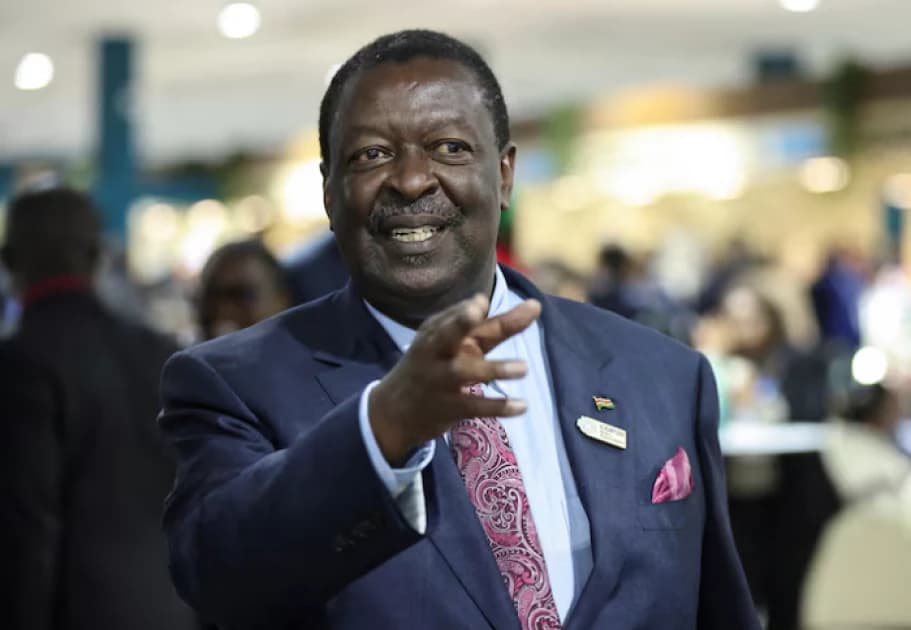We're loading the full news article for you. This includes the article content, images, author information, and related articles.
Prime Cabinet Secretary Musalia Mudavadi has commended the Kenyan Police Service, highlighting its role as a model of professionalism in international peacekeeping missions and urging continuous upholding of high standards.

Prime Cabinet Secretary Musalia Mudavadi on Sunday, October 12, 2025, lauded the Kenyan Police Service (KPS) as one of the most professional security forces globally. Speaking at a homecoming ceremony for Dr. Amani Komora, the newly appointed Chairperson of the National Police Service Commission (NPSC), in Oda Village, Tana River County, Mudavadi emphasised the KPS's exemplary conduct in international peacekeeping operations.
Mudavadi, who also serves as the Cabinet Secretary for Foreign and Diaspora Affairs, pointed to the participation of Kenyan officers in over 50 international peace missions as a testament to their professionalism and discipline. He specifically cited the deployment of more than 800 Kenyan police officers to Haiti, noting that after 15 months, no human rights violations had been recorded. “Our security forces are professional, orderly and regarded globally. We must ensure that the standards are kept at any given time,” Mudavadi stated.
The Kenyan Police Service has undergone significant reforms, particularly following the 2007 post-election violence. The National Taskforce on Police Reforms (Ransley Report) in 2009 recommended wide-ranging changes, including the restructuring of police services, decentralisation, and enhanced transparency and accountability. The Constitution of Kenya 2010 further entrenched these reforms, leading to the establishment of the National Police Service Act 2011, the National Police Service Commission Act 2011, and the Independent Policing Oversight Authority (IPOA) Act 2011.
These reforms aimed to transform the police into a professional, efficient, and accountable service trusted by the public. Key initiatives have included the merger of the Kenya Police and Administration Police into a unified National Police Service, vetting of officers, and modernisation through systems like the Integrated Communication and Surveillance System (ICSS). Despite these efforts, challenges such as allegations of bribery, human rights violations, and a weak link between law enforcement and the community persist.
The NPSC, now chaired by Dr. Amani Komora, plays a crucial role in managing the employment and discipline of police officers. Mudavadi urged Dr. Komora to uphold and strengthen the high standards within the police service, building on the legacy of his predecessor, Mr. Eliud Kinuthia. The Independent Policing Oversight Authority (IPOA) provides independent investigation of complaints against police officers, ensuring accountability.
Analysts suggest that the Prime Cabinet Secretary's commendation could influence public debate and policy execution, with stakeholders seeking clarity on timelines, costs, and safeguards for ongoing reforms. The Law Society of Kenya (LSK) has previously highlighted concerns about corruption and inefficiency within government agencies, underscoring the need for continued vigilance and multi-sector collaboration to ensure transparency and accountability.
While the commendation boosts morale, the sustainability of high professional standards depends on continuous investment in training, welfare, and robust accountability mechanisms. The historical challenges of corruption and human rights concerns within the police force, as noted by various reports, highlight the need for ongoing reform efforts to address these deeply entrenched issues. Maintaining public trust requires consistent adherence to the rule of law and respect for human rights.
The focus now shifts to how the NPSC, under Dr. Komora's leadership, will implement strategies to further enhance police professionalism and address existing gaps. Stakeholders will be keenly observing the execution of police reform policies, particularly regarding transparency, accountability, and community engagement. The government's commitment to providing adequate resources and political will remains crucial for the sustained success of these reforms.
Keep the conversation in one place—threads here stay linked to the story and in the forums.
Sign in to start a discussion
Start a conversation about this story and keep it linked here.
Other hot threads
E-sports and Gaming Community in Kenya
Active 9 months ago
The Role of Technology in Modern Agriculture (AgriTech)
Active 9 months ago
Popular Recreational Activities Across Counties
Active 9 months ago
Investing in Youth Sports Development Programs
Active 9 months ago